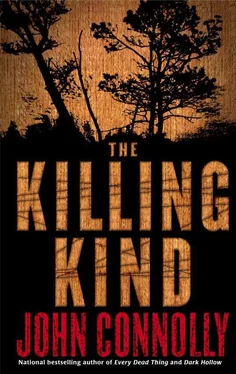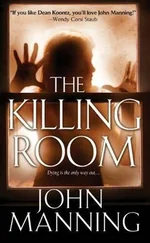Grace Peltier must have stood here, weeks earlier, before she scaled the gates and walked onto the causeway. She must have waited until they were gone, until she was certain that the island was unoccupied and that nobody would be returning for some time, and then crossed over. But she had activated the sensors, alerting them to an intruder, and the system would have informed Pudd or his sister, automatically calling a pager or his cell phone. When they returned, closing off the causeway, Grace had taken to the sea. That was why her clothes had been soaked with seawater. She was a strong swimmer. She knew she could make it. But they had seen her face on the camera's tapes, maybe even spotted her car. Lutz and Voisine had been alerted, and the trap was closed on Grace.
I looked out on the dark waves, glowing whitely as they broke, and decided to take my chances with the sea. I unloaded the spare.38 at my ankle, then put the bullets and the spare clip for the Smith amp; Wesson beneath my arm into a Ziploc plastic bag. Something tightened in my belly, and the old feeling came over me again. The sea before me was a dark pool, the hidden place on which I had drawn time and time before, and I was about to plunge into it once more.
I waded through the water, teeth chattering as I approached the causeway. Waves rocked me and once or twice I was almost pushed back to the shore by their force. The stones and rocks that made up the causeway were slick and spotted with green algae, and the tide was already splashing almost to the level of my waist. I tried to wedge my boots into the cracks and hollows, but the rocks had been bound with cement, and after only two awkward sideways movements, my feet slid from under me and I lost my grip. I slid quickly back into the sea, the water drenching me to my chin. As I recovered from the shock, a line of white emerged to my left and I barely had time to take a breath before a huge wave lifted me off my feet and pushed me back at least fifteen feet, salt water filling my mouth as the rain fell and seaweed twisted around me.
When the wave had passed, I began to wade again along the edge of the rocks, trying to find a point at which I could pull myself back onto the road. It took me about ten minutes and two more dousings to find a hollow where one of the stones had fallen from the concrete. Awkwardly, I placed a wet boot into the alcove, then barked my knee painfully as it slipped out. Digging my fingers around one of the highest stones, I tried again and managed to haul myself up and onto the road. I lay there for a moment, catching my breath and shivering. My cell phone, I discovered, was now at the bottom of the sea. I stood, let the water run out of the barrel of the Smith amp; Wesson, reloaded the.38, and continued on down the causeway at a crouch until I reached the island.
Thick green firs grew on either side of the road as it made its way to the remains of the lighthouse, where the road became part of a gravel courtyard that touched on the entrance to each of the island's structures. There should have been nothing more than a pile of old stones where the original lighthouse had once stood, but instead I found an edifice about thirty feet high, with an open gallery at the top surrounded by a chain-link fence, offering a clear view of the causeway and the coast itself. It was a lighthouse without a light, except for a faint illumination in one of the windows at the highest enclosed level.
To the right of the new lighthouse stood a long wooden single-story building with four square windows covered with wire frame, two on either side of the heavy door. A greenish glow emanated from it, as if the light inside was struggling to penetrate water or the leaves of plants. In front of the lighthouse, blocking my view of its entrance, was what I took to be a garage. Farther back, almost at the eastern edge of the island, was a second similar structure, possibly a boathouse. I leaned against the back of the garage and listened, but I could hear nothing except the steady falling of the rain. Staying on the grass and using the building as a shield, I began to make my way toward the lighthouse.
It was only when I cleared the garage that I saw him. Two tree trunks had been bound together to form an X, supported in turn by a second pair of trunks that kept the cross at an angle of sixty degrees to the ground. He was naked, and his arms and legs had been bound to the wood with wire. There was a lot of bruising to his face and his upper body, and swellings on his arms, chest, and legs that looked like the result of bites. Blood had flowed from the wounds in his femoral arteries and lay pooled on the ground below him. The rain washed over his pale body, dripped from the soft flesh on his arms and glistened on his bare skull and white, hairless face. A patch of skin was missing from his stomach. I moved closer to him and checked his pulse, his skin still warm to the touch. The Golem was dead.
I was about to leave him when gravel crunched to my right and the mute appeared. There was mud on her boots and her loose denim jeans, and she wore a yellow windbreaker, which hung open over a dark sweater. She held a gun in her right hand, pointing to the ground. There was no time for me to hide, even if I wanted to.
She stopped short when she saw me, her mouth opened soundlessly, and she raised her arm and fired. I dived left. Beside me, the Golem's body shuddered slightly as the bullet struck his shoulder close to where my head had been. I knelt, sighted, and squeezed the trigger. My first shot took her in the neck, the second in the chest. She twisted, her legs wrapped themselves around each other, and she fell, loosing off two shots into the air as she hit the ground. I ran to her, keeping the gun trained on her body, and kicked her gun away from her right hand. Her left leg was trembling uncontrollably. She looked up at me, the scars on her neck now obscured by the blood flowing from her wound. Something rattled in her throat, her mouth opened and closed twice, and then she died.
In the outbuilding to my right, a shape distorted the flow of green light for an instant. A thin shadow passed across the glass and I knew instinctively that Mr. Pudd was waiting inside for me. He could not have failed to have heard the shots, yet he hadn't responded. Behind me the door of the lighthouse remained securely closed, but when I looked to the top of the building, the light that had been burning was now burning no longer. In the darkness it seemed to me that something was watching me closely. Pudd would have to be dealt with first, I thought; I did not want him at my back.
Quickly, my hands brushing the long, wet grass, I ran to the door of the outbuilding. There was a small glass panel at about face level, crisscrossed with wire, and I stayed low as I passed beneath it. A bolt had been pulled across midway down the door, and a lock hung open beneath it. Stepping to one side, I eased my foot against the crack and pushed the door open.
Three shots sounded and the door frame exploded in showers of splinters and flaking paint. I jammed my gun into the gap and fired five times in an arcing pattern, then threw myself into the room. I could still hear glass falling as I sprinted to the far left wall, but no more shots came. Working quickly, I ejected the magazine from the Smith amp; Wesson and replaced it with a full clip, scanning the room while my hands worked at the gun.
The stench was incredible, a powerful smell of decay and defecation. There were no lights on the ceiling or on the walls, and the single skylight had been draped with folds of thick, dark cotton to prevent direct sunlight from falling on the room. Instead, the only illumination came from small shielded bulbs set below the metal shelves that ran in five rows across the width of the room. The shelves had four levels, and the green tint to the light came from plants that grew in pots alongside the glass cases that rested on each shelf. Every case or cage on the shelves had a thermometer and a humidity gauge, and dimmer switches had been placed in series with the lightbulbs to reduce the intensity of their radiant heat. Aluminum foil had been used to partially shield the bulbs, protecting the spiders and insects in the cases from direct light, while the use of foliage further softened the glare. The bulbs were not powerful enough to penetrate to the farthest corners of the room, where thick pools of darkness lay. Somewhere among them, Pudd waited, his form hidden by the shadows and the greenery.
Читать дальше












